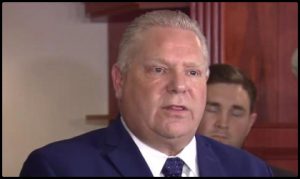In Canada and the government of Ontario Premier Doug Ford (pictured) has reportedly been warned that the province could lose up to $2.2 billion in public revenues over the course of the next five years if it institutes a planned 20% tax rate on online gaming.
According to a Monday report from the Canadian Broadcasting Corporation (CBC), the caution was contained in a special January 11 investigation prepared by HLT Advisory Incorporated at the behest of local land-based casino operator Great Canadian Gaming Corporation. This confidential exercise entitled Ontario Gaming Market Assessment purportedly asserts that the province could soon be missing out on as much as $439.5 million in annual tax revenues if it institutes its proposed ‘open license’ iGaming regime.
Differing duties:
The broadcaster reported that the ‘open license’ system being pursued by Ford’s administration would look to triple business for iGaming sites across Canada’s most populated province so as to see these domains eventually rack up estimated annual aggregated revenues of up to $5.6 billion. However, such remote operations would purportedly be obliged to pay only a 20% net revenues tax even as their land-based counterparts maintained an existing 55% rate.
Considerable concern:
Tony Rodio serves as the Chief Executive Officer for Great Canadian Gaming Corporation and reportedly told the CBC that he is worried that the proposed ‘open license’ model from the Ford government could lead to local land-based casino operators having their revenues ‘cannibalized’ by rival iGaming firms. The executive purportedly warned that the differing tax rates may also create an unlevel playing field and prompt retail providers in Ontario to shed up to 25% of their workforces for the loss of some 2,500 jobs.
Rodio reportedly told the CBC…
“The report includes critical learnings from other jurisdictions that introduced iGaming and cannibalized land-based operators in the process. While we support iGaming in principle, the Ontario government needs to take the time to get this right.”
Improper hypothesis:
Conversely, Jeffrey Haas, Senior Vice-President for American online sportsbetting giant DraftKings Incorporated, reportedly asserted that the findings from the new report incorrectly rely on an assumption that existing land-based casino players will swiftly switch to spending more of their entertainment cash on already-available Internet gambling websites. He purportedly noted that the ‘open license’ model could instead lead to more money being spent with onshore domains rather than offshore services.
Domestic determination:
The CBC reported that industry figures estimate that Ontarians already spend some $400 million a year on iGaming with almost all of this business currently being with foreign domains. Using the experience of the United Kingdom’s 2005 deregulation of its own online gambling market and the Ontario Gaming Market Assessment examination purportedly proclaimed that the ‘open license’ model for the province of almost 13.5 million people may result in local iGaming operators capturing ‘a significant share of the total casino market’.
Reportedly read a statement from Haas…
“When the regulated market opens in Ontario, nothing is going to change in respect to players’ entertainment habits. People who are playing in online casinos and online sportsbooks and online poker rooms will continue to do so, except they’re going to go from playing offshore to onshore and anybody who continues to walk into real casinos in order to play games there will continue to do so.”



